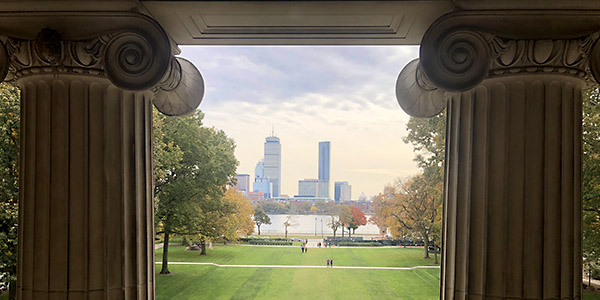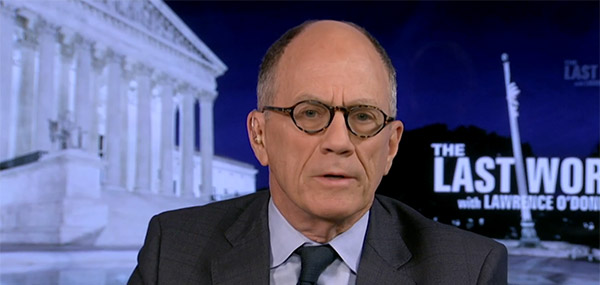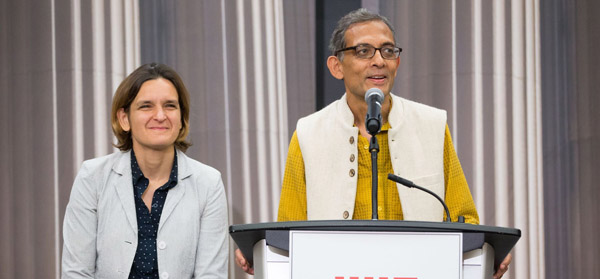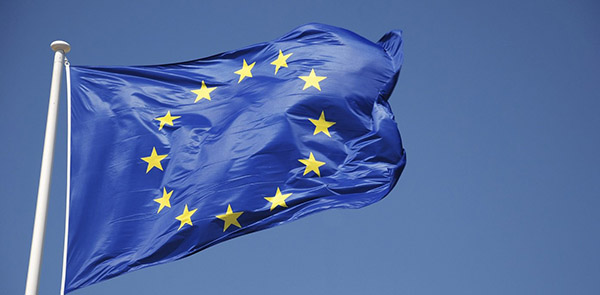MIT SCHOOL OF HUMANITIES, ARTS, AND SOCIAL SCIENCES
Media + Awards Digest | November 2019

The Media + Awards Digest is a section of the Said and Done newsletter. Subscribe
Office of the Dean | 19 November 2019
Dear Friends,
Greetings from MIT’s School of Humanities, Arts, and Social Sciences. We think you’ll find that this monthly digest, featuring coverage of MIT’s humanistic fields by the national and international media, as well as major external awards and honors, is a convenient way to follow the impact of MIT’s humanistic work globally.
ln this edition, for example, you will find our experts contributing commentaries and giving interviews on the future of work, on guaranteed income, on why US law provides anonymity to government whistleblowers, and on the role of wives in the works of their famous author spouses — to name just a few subjects.
Our faculty's engagement with the media takes many forms, including op-eds, interviews, reviews, and videos. The engagement takes time as well, and I am grateful to my colleagues for their generous contributions of research and analysis that clarify and deepen our civic conversations.
Melissa Nobles
Kenan Sahin Dean
MIT School of Humanities, Arts, and Social Sciences
2020 ACADEMIC RANKINGS
MIT RANKED NO.1 WORLDWIDE FOR ECONOMICS, SOCIAL SCIENCES

TIMES HIGHER EDUCATION
MIT ranked No. 1 worldwide for the Social Sciences
Times Higher Education awards top honors to the social science fields in MIT SHASS, including Anthropology, Comparative Media Studies, Political Science, and Women's and Gender Studies.
Story by MIT SHASS Communications
TIMES HIGHER EDUCATION
MIT ranked No. 1 worldwide for Economics and Business
Times Higher Education awards top honors to fields in MIT SHASS and MIT Sloan for the second year in a row.
Story by MIT SHASS Communications
MEDIA DIGEST
INTERNATIONAL STUDIES

Joel Brenner, Senior Research Fellow, MIT Center for International Studies
MSNBC
Video: US law protects a whistleblower's right to anonymity | Joel Brenner
Joel Brenner, former Inspector General of the NSA and former head of U.S. counterintelligence, explains that U.S. law explicitly protects a whistleblower's right to anonymity and discusses how Trump's threats and demands that the "Ukrainegate" whistleblower's identity be revealed will discourage whistleblowers from sharing information that helps protect the country.
Video interview at MSNBC | Joel Brenner webpage
FOREIGN AFFAIRS
Review of Special Duty, by Richard Samuels
Samuels concludes that the ups and downs of the past century—combined with growing uncertainties in the regional security environment—have convinced Japanese leaders of the critical importance of striking balance between power and insight.
Review at Foreign Affairs
FOREIGN POLICY
Baghdadi’s martyrdom bump | Jadbabaie, Nielsen
Will the death of Islamic State leader Abu Bakr al-Baghdadi meaningfully undermine the popularity of his militant ideas? Data we analyzed from jihadi websites suggests that the answer is no.
Article at Foreign Policy
ECONOMICS | JOBS + WORK OF THE FUTURE

Cyborg assembly line; iStock photograph
VOX
Displaced workers need more than basic income | Acemoglu, Restrepo
MIT's Daron Acemoglu and Yale's Pascual Restrepo estimate that robots caused a sizable decline in employment for laborers between 1990-2007. But these findings hardly indicate that robotics will lead to future mass joblessness. Instead, they should encourage us to develop policies to help workers succeed in the face of dislocations.
Story at Vox
THE WALL STREET JOURNAL
MIT on the Work of the Future
“Countries that make well-targeted, forward-looking investments in education and skills training should be able to deliver middle-skill jobs with favorable earnings and employment security to the vast majority of their workers.”
Commentary at the WSJ
WBUR
Warren proposes letting workers hire corporate board members | Simon Jäger
In Germany, one of the biggest capitalist companies in the world, workers at big corporations elect 50% of the board. At medium-sized companies with up to 2,000 employees, workers elect a third of the board, says Simon Jäger, an MIT economist who has studied the policy's impact on German industry.
Story at WBUR
THE MIT PRESS READER
Predictions for the next century | Robert Solow
The MIT professor emeritus and Nobel laureate considers the effects of climate change on economic growth, the rise of income inequality, and the shifting work year.
Predictions at MIT Press Reader
HUMANITIES

Eclipse, 1912, Paris; photograph by Eugene Atget, public domain
NEW BOOKS NETWORK
Podcast on Paris and Photography | with Catherine Clark
Clark examines how publishers, historians, public servants, and a range of other actors participated in making Paris the quintessential capital of photography from the nineteenth century up to the 1970s.
Podcast on New Books Network
C19 PODCAST
Wives and Their Authors | with Melville Scholar Wyn Kelley
Episode explores the extraordinary efforts that Elizabeth Melville undertook, after her husband Herman's death, to republish his books and to preserve his records. Examining the way that Elizabeth's efforts were written out of the "Melville Studies" that her labors helped to found, we consider how many lives support the career of One Great Man.
Podcast on Sound Cloud
SCIENCE, TECHNOLOGY, AND SOCIETY

San Onofre Nuclear Generating Station, California; photograph by the Los Angeles Times
LOS ANGELES TIMES
Nuclear accidents often aren’t surprises | Kate Brown
Op-ed in the Los Angeles Times by Kate Brown, MIT Professor of Science, Technology and Society, on the decommissioning of the San Onofre Nuclear Generating Station.
Commentary at the Los Angeles Times
POLITICAL SCIENCE | MIGRATION ISSUES AND TAX POLICY

African asylum seekers; Photograph by Isaac Guzman / Getty Images / The Boston Globe
THE BOSTON GLOBE
Migration is a human rights issue | Shola Lawal
Under Trump's administration "the US is treating migration as anything but a human rights issue. But that's precisely what it is, and willingly returning asylees to the unsafe territories they've fled, or outsourcing humanitarian responsibilities to weaker 'buffer states,' is a violation of international law."
Story at the Boston Globe
BBC
Will US billionaires really pay more tax? | Andrea Louise Campbell
Campbell, an MIT political scientist who is researching American attitudes toward taxation, finds that although Americans have long said that they favour higher taxes on the wealthy, at the ballot box their support depends on what kind of tax is being proposed.
Story at BBC
BLOOMBERG
Taxing the rich to support general well-being is Nobel winner's advice for growth
Reducing taxes to boost investment is a myth spread by businesses, says MIT economist and Nobel laureate Abhijit Banerjee. “You are giving incentives to the rich who are already sitting on tons of cash.”
Profile at Bloomberg
ECONOMICS | GOVERNANCE, HEALTHCARE, POVERTY ALLEVIATION

MIT economists Esther Duflo and Abhijit V. Banerjee; photo by Scott Eisen/Getty Images
BLOOMBERG OPINION
Advice for leaders, be more compassionate toward those left behind
Professors Abhijit Banerjee and Esther Duflo discuss their new book, Good Economics for Hard Times. Banerjee notes that the book was written for “people who feel they want a reasoned resolution to the conflicts of today but do not see how to get there.”
Story via Bloomberg Opinion
FORBES
What does Esther Duflo's Nobel Prize mean for gender equity in economics?
"An 'inefficient equilibrium.' That’s how The Economist described gender balance in the field of Economics in 2017. For economists inefficient means that the economy is producing below the maximum possible output based on the resources at its disposal. Maybe Professor Esther Duflo’s Nobel Prize will be the force we need to shift the equilibrium to an efficient point both for women in the field and for society as a whole."
Story at Forbes
VOX
Elizabeth Warren’s Medicare-for-all plan, explained | Amy Finkelstein
“We have an enormous amount of evidence that leaves no doubt in any sensible person's mind that getting rid of cost-sharing provisions increases demand for, and use of, health care,” says Amy Finkelstein, an MIT economist who has studied coverage expansions extensively.
Story at Vox

the European flag
TECHCRUNCH
Europe is now the great champion of free markets | Thomas Philippon, PhD '03
According to a new book by French economist Thomas Philippon, Americans' view of their country as the world's beacon of free market competition and Europe as an over-regulated region of lethargic corporate giants is out of date, and may be inhibiting our ability to recognize growing corporatism at home.
Story at TechCrunch
NEW YORK TIMES
Economic incentives don’t always deliver acceptable outcomes | Duflo and Banerjee
On their own, markets can’t deliver outcomes that are just, acceptable — or even efficient. If it is not financial incentives, what else might people care about? The answer is something we know in our guts: status, dignity, social connections. The authors were just awarded the Nobel Prize in economics.
Commentary
BLOOMBERG
Autocracy is no model for developing economies | Daron Acemoglu
Daron Acemoglu of MIT and James Robinson of the University of Chicago have dug much deeper in their bestsellers Why Nations Fail and The Narrow Corridor. Their conclusion is that while some countries may get a short-term boost under authoritarian governments that turn from socialism to capitalism, it doesn't last.
Story at Bloomberg
THE ECONOMIST
Money talks: A Nobel endeavour
What causes poverty? Rachana Shanbhogue interviews this year’s winners of the Nobel prize for economics — Esther Duflo, Abhijit Banerjee, and Michael Kremer. Their pioneering work has changed the understanding of one of the hardest problems in economics: why do some countries grow rich while others stay poor?
Stream the podcast
The Media + Awards Digest is a section
of Said and Done, the School's online newsletter.
EXPLORE
Follow us




Subscribe to Said and Done
10 issues a year
Research
Impact
Ethics, Computing, and AI: Perspectives from MIT
Browse the Series
Computing and AI: Humanistic Perspectives from MIT
Browse the Series
MIT Climate website | Humanistic research
A major source of research, innovation, and discussion
Join us!
SHASS on MIT News
Research and Features
MIT Campaign for a Better World
Story| Join Us

Published by SHASS Communications
Office of the Dean, MIT School of Humanities, Arts, and Social Sciences
Editor and Designer: Emily Hiestand
Publication Associate: Alison Lanier
Media Relations Manager: Steve Oakes
Published 20 November 2019